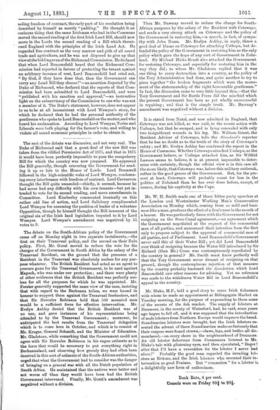The rest of the debate was discursive, and not very
real. The Duke of Richmond said that a great deal of the new Bill was -taken from the vilified Permissive Act of 1875, and that in 1875 it would have been perfectly impossible to pass the compulsory Bill for which the country was now prepared. He approved the Bill generally, though censuring the Government for send- ing it up so late to the House of Lords. Lord Bramwell followed in the high-scientific wake of Lord Wemyss, condemn- ing every interference with freedom of contract. Lord Carnarvon thought the Bill quite unneeded—chiefly, it seemed, because he had never had any difficulty with his own tenants—but yet in- tended to vote for its second reading, and move amendments in 'Committee. Lord Kimberley commented ironically on this rather odd line of action, and Lord Salisbury complimented Lord Wemyss for assuming the position of leader of a volunteer Opposition, though he himself thought the Bill innocent of the original sin of the Irish land legislation imputed to it by Lord Wemyss. Lord Wemyss's amendment was negatived by 55 votes to 9.


































 Previous page
Previous page